2019 Sermon Series: The Gospel of Trees
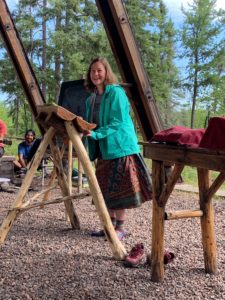 I don’t usually start sermons this way… but since this ground is the holiest ground I ever get to stand on, I am going to read a tiny bit from Moses’s encounter with God. God appears in a burning bush and says, “Moses! Remove the sandals from your feet, for the place on which you are standing is holy ground.” In honor of this holy ground… that is part of the Band of Brothers Chapel on Dominion Island in Seagull Lake… I am ditching my shoes. And if you want to, you can too.
I don’t usually start sermons this way… but since this ground is the holiest ground I ever get to stand on, I am going to read a tiny bit from Moses’s encounter with God. God appears in a burning bush and says, “Moses! Remove the sandals from your feet, for the place on which you are standing is holy ground.” In honor of this holy ground… that is part of the Band of Brothers Chapel on Dominion Island in Seagull Lake… I am ditching my shoes. And if you want to, you can too.
Our readings for worship today are mixed in throughout my sermon… so don’t be alarmed when good people stand up and start reading.
Our first readings come from Genesis 1 and Deuteronomy 8:
Readings, part 1: Genesis 1: 11-13, Deuteronomy 8: 7-10
1. My favorite WCB job was the summer I spent as Naturalist. I was an English major in college though, so I did a lot of studying to prepare for that summer. I was so excited when it was time to give my first Nature Hike and Orientation. Until I discovered that it was for a group of adults, and one of those adults had been a beloved high school biology teacher for 40 years. His name was Don Meyer and we became friends for years after that first orientation. He graciously let me lead and answered my questions with great humor. He taught me that spirals are a shape that exist every where in nature: they are strong and efficient.
2. Strong things grow in spirals and I’ve never been anywhere where this fact is more obvious & holy than HERE… at Wilderness Canoe Base. Strong things grow in spirals.
A. the Milky Way Galaxy, that you can see perfectly from the bridge, is one massive bright, shining spiral of stars, with their planets and moons spinning around
B. ALL plants spiral… and you can see these spirals in jack pine pinecones, blueberry bush blooms, bracken fern, and ox-eye daisy petals
C. and you spiral too. Your muscles are STRONG spirals after this season of paddling, portaging, Sysco hauling, and even simply hiking to the outhouses. Your bones spiral, your nerves cells spiral, and your DNA spirals billions of times.
D. Your relationships with these people you’ve worked with this summer will spiral too… not out of control… but your relationships will spiral in the way that sometimes you’ll feel close and sometimes you’ll feel far… but these people have made you stronger in your own spiraling… and you will forever be connected in the spiral of the Boundary Waters and Wilderness Canoe Base. This is holy ground.
E. Did you know there is a fifteen hundred year old cedar in the cove?! The Forest Service tested its core back in the late 90’s and its rings revealed its age to be approximately 1500 years old. In someone’s filing cabinet somewhere, maybe at Jim Wiinanen’s house or in some closet in Pinecliff somewhere, there’s even an official letter. I’ve seen it. That cedar has been spiraling for centuries, its silver bark softening, branches reaching toward the sky. During the American Revolution and Two World Wars, it spiraled. It spiraled during the birth of the printing press, the life of Muhammad, and then through the entire Renaissance with its DaVinci, Shakespeare, and Michelangelo. It spiraled while the Ojibwa lived here peacefully and after the Voyageurs journeyed through. It spirals still, and it greets us near the shore by the dock whenever we come back home. Strong things grow in spirals.
***When you leave this forest this summer, you must take these spirals with you.
F. Sometimes, when God feels much too far away, in a world that is such a mess, I remember these spirals and holiness is suddenly close at hand. Spirals remind me that, wherever I am, the ground can be holy ground.
G. God promises that “we will be brought into a good land, a land with flowing streams, with stones of iron, a land of honey… and trees.”
Readings, part 2: Genesis 3: 8-11, Luke 23:44-46
2. But, sometimes, even a spiral is not strong enough. We all know this to be true.
A. Twenty years ago this summer, scientists estimate that tens of millions of trees were uprooted in the historic Blow Down storm.
B. There used to be a lovely birch tree back there along the trail, tall and always bright- it always seemed to catch the sunshine despite thw weather: it survived the blow down and our amateur ‘controlled burns’ in 2001, to clean up from the Blow Down… but it’s spirals weren’t strong enough to hold too much ice and it went down during a winter storm in 2004
D. There was a jack pine on the trail by the Block house, where the old Nature Nest cabin used to be… and on a windy day you could stand on its roots and ride the tree as it was tossed in the wind… the roots in this thin, rocky soil would gently lift you up and then set you back down. That tree doesn’t exist anymore either. I’m not sure when its spirals came down.
E. Wilderness Legend, Ken Peterson, was one of the strongest people I’ve ever met. His spirit was a holy spiral, inviting everyone in… including the kids he took to the Hudson Bay as a guide back in the ‘60s, his patients when he was a medical doctor, his friends from Wilderness, and my husband and I when we moved near his home in Alaska for our first year of marriage… and AmeriCorps… and adventure. You have maybe heard the end of his story: that his warm spiral couldn’t stop that border patrol agent whose car hit him on the Gunflint. Near the gigantic spiraling trunks of the Washington Pines, Ken died.
F. No, sometimes spirals are not strong enough… and if you didn’t know Ken, you do know someone whom you miss. We all carry stories of broken spirals with us.
G. And yet… life grows back… because God is in it all. This ground is holy ground.
Readings, part 3: Mark 16:5-8, Job 14:7-9
3. Life grows back… because God is in it all.
A. Because our three-in-one-God: the Creator, the Messiah, and the ever- mysterious Holy Spirit dance a spiral dance that never ends… this forest is healing from that Blow Down and all its fires. It is changing… yet it is healing. Because of our Spiraling God, you are here breathing in and out- strong. Because we have a Messiah whose spiral included the deepest depths of despair, we can survive our own dark days.
B. There is hope for trees… even trees that have been cut down, says Job. And Job would know about that.
C. There is hope because of spirals… which are God’s strongest shape.
***When you leave this forest this summer, you must take these spirals with you.
D. There is hope because of God- who has not only made this ground holy- but who has also promised you life and light unending.
Readings, part 4: Revelation 22:1-2, Isaiah 55:12
4. You have work to do. This holy ground needs a voice. Your voice.
A. You’ve worked hard this summer: cooking endless meals, paddling for miles, starting campfires, setting up tents, hauling Duluth packs full of EVERYTHING, listening to kids, caring for kids, teaching kids… and you’ve done so, so well. But, your job is not ending with the summer.
B. When you leave these islands and go back to your cabin, or the city, or college, or your job, or family and friends, or you’re off to brand new adventures… ***YOU MUST TAKE THESE SPIRALS WITH YOU!
C. This holy ground- on which your feet are resting- is full of remedies for the stress of living:
1. This holy ground is timeless… while people are too good at rushing around.
2. This ground is quiet… while so many people are so full of noise.
3. This ground grows loving community… while politics just grow suspicion and hate.
4. This ground teaches us to be dependent on one another… while the culture we’re living in tricks people into thinking we’re independent.
5. This ground, with its spirals, shows us holiness in new and soul-tending ways… and all the people I know are hungry for this sort of holiness.
D. When you leave this place…
You must teach people timelessness.
You must show them how to be quiet.
You must expect deep, loving communities wherever you live.
You must practice dependence.
And I hope you will celebrate holiness.
Do these things and you will be a voice for this place… spreading holy ground wherever you go. TAKE THE SPIRALS OF THIS PLACE WITH YOU. And have no fear. God always promises to be with you.
Blessing: May you go out into the world in joy, and be led back here to this place in peace; when you tell of these spirals with your own voice, the lakes and the hills before you shall burst into song, and all the trees of the forest shall clap their hands.
By Rev. Sarah Clark, former WCB staff member
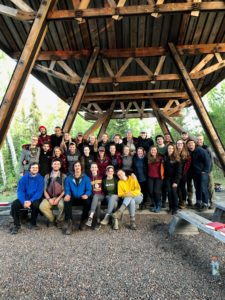 Throughout this past summer, campers, guests, and staff associated with Lake Wapogasset Lutheran Bible Camp, Inc. had opportunities to talk and learn about their faith through an overarching theme of, ‘Claimed, Wildly Loved By God.’ At its essence, this theme tells us that God loves us wildly and unconditionally. In a world that often makes us feel like we are ‘not enough,’ the message of God’s abounding love for us is a message of hope and assurance, and a message that we are created in God’s image and are in fact more than enough.
Throughout this past summer, campers, guests, and staff associated with Lake Wapogasset Lutheran Bible Camp, Inc. had opportunities to talk and learn about their faith through an overarching theme of, ‘Claimed, Wildly Loved By God.’ At its essence, this theme tells us that God loves us wildly and unconditionally. In a world that often makes us feel like we are ‘not enough,’ the message of God’s abounding love for us is a message of hope and assurance, and a message that we are created in God’s image and are in fact more than enough.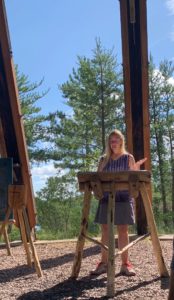 How many of you feel the call to the wilderness? For many of you I would guess that is why you are here, a continual call into the Wilderness. What does that call to the wild feel like? Is it something you can feel in your gut, a warming in your heart, or a peacefulness in your mind. Maybe the feeling is hard to articulate but the visceral longing and need to be in the wild is undeniable for many of you. Over the last several days as I’ve been listening to reflections of groups coming off the trail and I can’t help but think about when these groups first arrived to camp. What is going through the thoughts and feelings of these groups when they set foot on the cove and look across the lake not knowing what is ahead of them. At that moment through all of the fear, excitement, and car sickness – Are they being called into the wilderness or are they sent? The same question may be asked of all of you today – whether you are staff, campers, guests, were you called to be here or sent?
How many of you feel the call to the wilderness? For many of you I would guess that is why you are here, a continual call into the Wilderness. What does that call to the wild feel like? Is it something you can feel in your gut, a warming in your heart, or a peacefulness in your mind. Maybe the feeling is hard to articulate but the visceral longing and need to be in the wild is undeniable for many of you. Over the last several days as I’ve been listening to reflections of groups coming off the trail and I can’t help but think about when these groups first arrived to camp. What is going through the thoughts and feelings of these groups when they set foot on the cove and look across the lake not knowing what is ahead of them. At that moment through all of the fear, excitement, and car sickness – Are they being called into the wilderness or are they sent? The same question may be asked of all of you today – whether you are staff, campers, guests, were you called to be here or sent?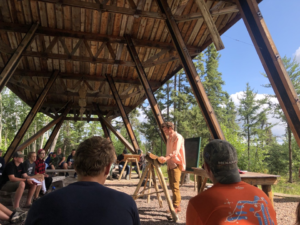 I’m Dan. I guide canoe trips at Wilderness Canoe Base this summer. Today, I’d like to talk about peace.
I’m Dan. I guide canoe trips at Wilderness Canoe Base this summer. Today, I’d like to talk about peace.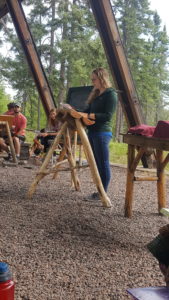 Anyone who has had a conversation with me in the last few days has probably heard me thinking out loud, often, with incredulity, and without much regard for the parameters of what we generally consider to be normal conversation, about how I can’t wrap my head around the symmetry of our reading from Exodus this morning and the news coming out of Sudan these past days and weeks.Tragically, the common thread between these two things is dead bodies in the Nile River. Yes – we are getting very serious, very quickly here. But leaning on the strength of our community and God who is the God of hope and justice, we will sit together with this difficult text buttressed against our difficult reality. And then, I hope, our community will continue the work we have already begun, which is to be the hands and feet of a God who organizes.<
Anyone who has had a conversation with me in the last few days has probably heard me thinking out loud, often, with incredulity, and without much regard for the parameters of what we generally consider to be normal conversation, about how I can’t wrap my head around the symmetry of our reading from Exodus this morning and the news coming out of Sudan these past days and weeks.Tragically, the common thread between these two things is dead bodies in the Nile River. Yes – we are getting very serious, very quickly here. But leaning on the strength of our community and God who is the God of hope and justice, we will sit together with this difficult text buttressed against our difficult reality. And then, I hope, our community will continue the work we have already begun, which is to be the hands and feet of a God who organizes.<